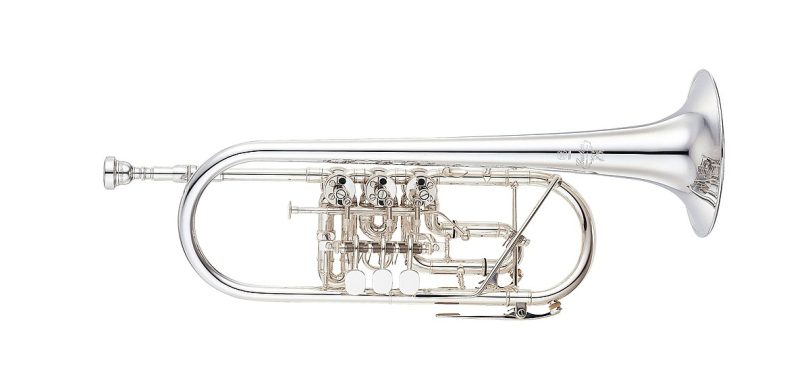A rotary trumpet is a type of trumpet that uses rotary valves instead of piston valves. It is a popular choice among professional musicians because of its unique sound and versatility.
The rotary trumpet has a characteristic mellow sound that blends well with strings and other wind instruments, making it a popular choice for orchestral music.
The rotary valves in a rotary trumpet are designed to redirect airflow through a longer set of tubes, resulting in a lowering of pitch.
This design allows for more subtlety and color change than a piston trumpet, making it a popular choice for soloists and those looking for a wider range of expression. While the rotary trumpet is often associated with classical music, it is also used in jazz and other genres.
What is a Rotary Trumpet?
A rotary trumpet is a type of brass instrument that uses a rotary valve system to change the pitch. Unlike the more common piston valve trumpet, which has a linear valve system, the rotary trumpet has a cylindrical valve system that rotates to align with different tubing lengths. This allows for a smoother, more continuous sound and greater flexibility in playing.
Rotary trumpets are particularly popular in German and Austrian orchestras, where they are often used for playing classical and traditional music. They are also used in jazz and other genres, particularly in Europe.
One of the main advantages of a rotary trumpet is its ability to produce a wider range of tones and colors. The rotary valve system allows for more subtle changes in pitch, which can be used to create a variety of different effects. Additionally, the cylindrical valve system can make it easier to play certain notes, particularly in the lower register.
However, rotary trumpets are not for everyone. They can be more difficult to play than piston valve trumpets, particularly for beginners. Additionally, they tend to be more expensive, and may not be as widely available as piston valve trumpets.
Nonetheless, for those who are willing to invest the time and effort to learn how to play them, rotary trumpets can be a rewarding and versatile instrument.
History of Rotary Trumpets
The rotary trumpet, also known as the German trumpet, was developed in the early 19th century following the invention of the standard trumpet.
The rotary valve was a revolutionary invention that allowed for a new type of trumpet to be developed. The rotary valve was first used in French horns and was later adapted to trumpets, resulting in the creation of the rotary trumpet.
The rotary trumpet was first used in Germany and Austria and quickly gained popularity in these countries due to its unique sound. The rotary valve system allowed for a more mellow and smooth sound compared to the sharp and bright sound of the piston valve system used in standard trumpets.
One of the most significant advantages of the rotary trumpet was its ability to blend well with other wind instruments and strings. This made it a popular choice for orchestral music, particularly in German and Austrian music. The rotary trumpet was also used in military bands due to its ability to produce a powerful and rich sound.
Over time, the popularity of the rotary trumpet declined as the piston valve system became more widely used. However, the rotary trumpet continued to be used in certain genres of music, particularly in German and Austrian music. Today, the rotary trumpet is still used by some professional musicians and is considered to be a unique and valuable instrument.
Advantages of Rotary Trumpets
Rotary trumpets have several advantages over other types of trumpets. Here are some of the key benefits:
- Better Blend with Other Instruments: Rotary trumpets have a darker timbre that blends well with woodwind and string sections in orchestras and other musical groups. This makes them ideal for harmonious ensemble settings.
- Increased Subtlety and Color: The tonal spectrum of a rotary trumpet changes rapidly from mellow in piano volume to white-hot molten in fortissimo. This makes it capable of a lot more subtlety and color than a piston trumpet.
- Ability to Play Louder: Rotary trumpets can produce a louder sound than piston trumpets during forte passages that feature the brass. This makes them ideal for playing in large ensembles or in outdoor settings.
- Improved Sound Quality: The design of rotary valves allows for a smoother airflow, resulting in a cleaner and more resonant sound. This is particularly noticeable in the lower register of the instrument.
Overall, rotary trumpets are a great choice for musicians who want a versatile instrument that can blend well with other instruments, produce a wide range of tonal colors, and play loudly when needed. Whether you’re a professional musician or a student, a rotary trumpet is definitely worth considering.
Disadvantages of Rotary Trumpets
While rotary trumpets have their advantages, they also have some disadvantages that players should consider before making a purchase.
One of the main disadvantages of rotary trumpets is that they can be more difficult to maintain and repair than piston trumpets.
The rotary valve system is more complex than the piston valve system, and it requires more precision and skill to keep it functioning properly. This means that players may need to spend more time and money on maintenance and repairs to keep their rotary trumpet in good condition.
Another disadvantage of rotary trumpets is that they can be more expensive than piston trumpets. Because the rotary valve system is more complex and requires more precision to manufacture, rotary trumpets tend to be more expensive than piston trumpets of similar quality. This means that players who are on a tight budget may not be able to afford a high-quality rotary trumpet.
Finally, rotary trumpets may not be as versatile as piston trumpets. While rotary trumpets are well-suited for certain types of music, such as classical and jazz, they may not be as well-suited for other genres, such as pop and rock. This is because the rotary valve system can make it more difficult to play certain types of music, such as fast and intricate passages.
| Disadvantages of Rotary Trumpets |
| More difficult to maintain and repair than piston trumpets |
| More expensive than piston trumpets of similar quality |
| May not be as versatile as piston trumpets |
Overall, while rotary trumpets have their advantages, they also have some disadvantages that players should consider before making a purchase. Players should weigh the pros and cons of rotary trumpets carefully to determine whether a rotary trumpet is the right choice for their needs and budget.
Rotary Trumpet vs. Piston Trumpet
When it comes to brass instruments, the trumpet is one of the most popular and versatile. There are two main types of trumpets: rotary and piston. While they may look similar, there are some key differences between the two.
One of the main differences between rotary and piston trumpets is the valve system. Piston trumpets have a valve system that uses a series of pistons to change the length of the tubing, while rotary trumpets use a rotary valve that rotates around a central axis to change the length of the tubing.
Another difference between the two types of trumpets is the sound they produce. Piston trumpets tend to have a brighter, more focused sound, while rotary trumpets have a mellower, more rounded sound. This makes piston trumpets ideal for playing lead parts in jazz and other genres, while rotary trumpets are better suited for playing in orchestras and other ensembles where a more blended sound is desired.
One advantage of rotary trumpets is their ability to produce a wider range of tones and colors. Because the rotary valve allows for more subtle changes in the length of the tubing, players can create a wider range of sounds and dynamics. This makes rotary trumpets a popular choice among classical trumpet players.
On the other hand, piston trumpets are generally easier to play and require less maintenance. The piston valve system is simpler and more reliable than the rotary valve system, which can be more prone to wear and tear.
Ultimately, the choice between a rotary trumpet and a piston trumpet comes down to personal preference and the style of music being played. Both types of trumpets have their advantages and disadvantages, and both can produce beautiful music in the hands of a skilled player.
Famous Players of Rotary Trumpets
Rotary valve trumpets are not as common as their piston valve counterparts, but they have still been used by many famous players throughout history. Here are a few notable musicians who have played rotary trumpets:
| Player | Orchestra | Brand of Rotary Trumpet |
| Adolph Herseth | Chicago Symphony Orchestra | Lechner |
| Charles Schlueter | Boston Symphony Orchestra | Thein |
| Adolf Holler | Vienna Philharmonic | Josef Monke |
| Konradin Groth | Berlin Philharmonic | Lechner |
| Martin Kretzer | Berlin Philharmonic | Lechner |
Adolph Herseth, former principal trumpet of the Chicago Symphony Orchestra, was known for his use of a Lechner rotary trumpet.
Charles Schlueter, former principal trumpet of the Boston Symphony Orchestra, played a rotary trumpet made by Thein. Adolf Holler, who played in the Vienna Philharmonic, was known for his use of a Josef Monke rotary trumpet.
Other notable players of rotary trumpets include Konradin Groth and Martin Kretzer, both of whom play in the Berlin Philharmonic and use Lechner rotary trumpets.
While rotary valve trumpets are not as widely used as piston valve trumpets, they have still been used by many talented musicians throughout history. These players have demonstrated the unique sound and capabilities of the rotary trumpet, and have helped to keep this instrument in the spotlight.







